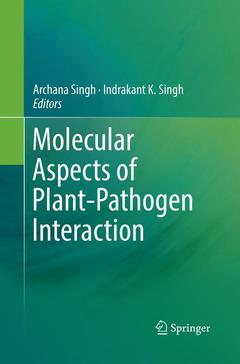Description
Molecular Aspects of Plant-Pathogen Interaction, Softcover reprint of the original 1st ed. 2018
Coordinators: Singh Archana, Singh Indrakant K.
Language: English
Subject for Molecular Aspects of Plant-Pathogen Interaction:
Publication date: 12-2018
Support: Print on demand
Publication date: 03-2018
Support: Print on demand
Description
/li>Contents
/li>Biography
/li>Comment
/li>
The book offers an integrated overview of plant?pathogen interactions. It discussesall the steps in the pathway, from the microbe?host-cell interface and the plant?s recognition of the microbe to the plant?s defense response and biochemical alterations to achieve tolerance / resistance. It also sheds light on the classes of pathogens (bacteria, fungus and viruses); effector molecules, such as PAMPs; receptor molecules like PRRs and NBS-LRR proteins; signaling components like MAPKs; regulatory molecules, such as phytohormones and miRNA; transcription factors, such as WRKY; defense-related proteins such as PR-proteins; and defensive metabolites like secondary metabolites. In addition, it examines the role of post-genomics, high-throughput technology (transcriptomics and proteomics) in studying pathogen outbreaks causing crop losses in a number of plants. Providing a comprehensive picture of plant-pathogen interaction, the updated information included in this book is valuable for all those involved in crop improvement.
Chapter 1. Arabidopsis thaliana as a Model system to study Plant-Pathogen Interaction.- Chapter 2. Fungal and Bacterial Biotrophy and Necrotrophy.- Chapter 3. Plant-Virus Interactions.- Chapter 4. Pathogen Related Effector Molecules and their Receptors: PAMPs & PRRs.- Chapter 5. Role of Nucleotide Binding Site-Leucine Rich Repeat (NBS-LRR) Proteins in Plant Defense.- Chapter 6. Recent Advancement on MAP Kinase Cascade in Biotic Stress.- Chapter 7. Signalling During Plant-Pathogen Interaction.- Chapter 8. Insights into the Role of WRKY Superfamily of Proteins Transcription Factor in Defense Response.- Chapter 9. Small Non-Coding RNA Based Regulation of Plant Immunity.- Chapter 10. Transcriptomics Studies Revealing Enigma of Plant-Pathogen Interaction.- Chapter 11. Proteomics Studies Revealing Enigma of Plant-Pathogen Interaction.- Chapter 12. Role of Pathogenesis-Related (PR) Proteins in Plant Defense Mechanism.- Chapter 13. Antimicrobial Compounds and their Role in Plant Defense.- Chapter 14. Explorations of Plant's Chemodiversity: Role of Nitrogen Containing Secondary Metabolites in Plant Defense.- Chapter 15. Plant Cell Wall; A Simple Physical Barrier or a Complex Defense Modulator; Exploring its Dynamic Role at Plant Fungus Interface.
Dr. Archana Singh is a Ph.D. in Plant Molecular Biology from the National Institute for Plant Genome Research (NIPGR). Since 2009, Dr. Archana has been working as an Assistant Professor in the Department of Botany, Hans Raj College, University of Delhi where she enjoys teaching Plant Biotechnology, Bioinformatics, Genetics, Cell Biology and Molecular Biology. She has been awarded with Young Scientist under Fast track Scheme (2013-2016) by Science & Engineering Research Board (SERB), Ministry of Science of Technology, Govt. of India. Dr Archana has also been awarded with a prestigious Raman-Post Doctoral Fellowship by University Grant Commission, Ministry of Human Recourses and Development Govt. of India. Dr. Archana’s quality research is evidenced by her publications in peer reviewed journals of international repute like Journal of Experimental Botany (Oxford), Scientific Reports, Journal of Integrated Plant biology, Journal of Asia-Pacific Entomology,Australasian Plant Pathology and Computational Biology & Chemistryand Plant gene. She has trained and supervised few Junior Research Fellows and M.Sc. & B.Tech. students for their research projects. Over the years, She expanded her research interests from Functional Genomics of Biotic stress to Bioinformatics and Proteomics.
Dr. Indrakant K. Singh is a Ph.D. in Zoology from the University of Delhi (DU). Since last ten years, Dr. Indrakant has been working as an Assistant Professor in the Department of Zoology, Deshbandhu College, University of Delhi where he enjoys teaching Genetics Genomics, Computation Biology and Immunology. He has been awarded with Young Scientist Award/Fellowship (2013-2016) by Science & Engineering Research Board (SERB), Ministry of Science of Technology, Govt. of India. Dr. Indrakant has also been awarded with a prestigious Raman-Post Doctoral Fellowship (2016-17) by University Grant Commission, Ministryof HuThese books may interest you

Plant-Microbe Interactions 210.99 €



